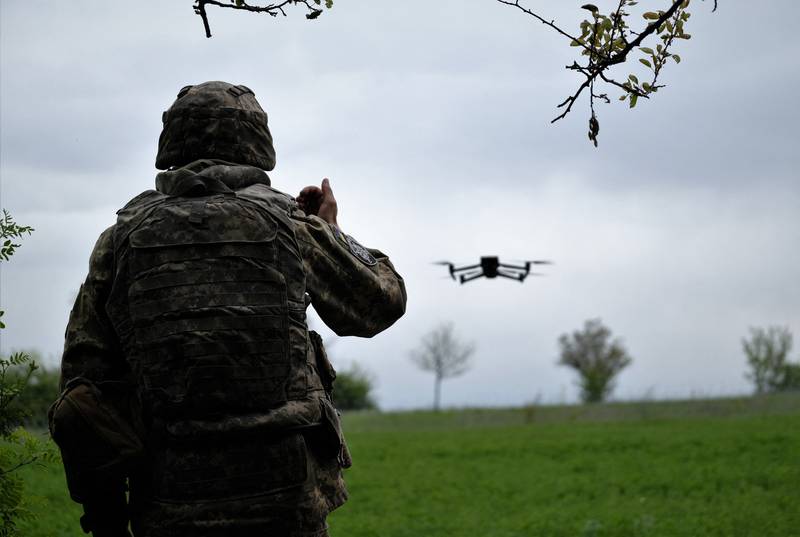PARIS — France is changing its acquisition process for light military unmanned aerial vehicles to become more nimble and signed a pact with local drone makers as the country’s Army threatens to fall behind in a technology that military leaders say is remaking warfare.
French Armed Forces Minister Sebastian Lecornu signed a “defense UAV pact” at the Eurosatory defense show here on Monday that provides the basis for working with the nation’s industry on defense drones below 150 kg (331 lbs), French armament agency DGA said.
The country “may have run up a bit of a delay” in the area of drones, and rather than developing drones for the coming years, France will cooperate with UAV makers to make a technological jump to the next generation of drones for the early 2030s, Lecornu said in a speech at Eurosatory.
All aerial drones that France sold to Ukraine were developed in-house by manufacturers without development input from the French armed forces, retired Maj. Gen. Claude Chenuil, a fomer military-acquisition executive, said during a round table discussion at Eurosatory. He said the Ukrainian armed forces will be using 1 million drones this year, compared with a French Army target to buy “a few thousand drones.”
France is investing €5 billion ($5.4 billion) in drones through 2030 as part of its military programming law, with the stated goal of developing a French loitering-munitions industry by the end of this decade, as well as achieving swarm-flight capability. The defense budget law included a target for the Army to have 3,000 tactical drones by 2025.
RELATED

Drones are changing combat, from loitering munitions to intelligence gathering, “and if we’ve fallen behind, it’s high time that we catch up,” said Maj. Gen. Erwan Salmon, the head of the ground combat management unit at DGA.
France needs to be able to acquire drones quickly and renew them as required by the pace of drone innovation, as well as be able to mass produce UAVs, “that’s the whole point of the defense drone pact,” Salmon said. That will require changing acquisition strategies to avoid ending up with drone systems “completely out of step with the innovations.”
French defense contracts often start from an armed forces requirement, after which the armament directorate drafts the specifications before organizing a contract, leading to programs that can take 10 years between the expression of a need and delivery, said Bastien Mancini, the CEO of French drone manufacturer Delair.
“Structurally, this is not possible with drones,” Mancini said. “Technologies are evolving fast. We need to be able to shorten lead times.”
The armament directorate will probably need to set up some financing to be able to quickly buy and test off-the-shelf products, to determine whether they should be acquired in larger numbers, Salmon said. The directorate’s acquisition service is looking into financing of technology bricks that could underpin the development of new systems, he said.
The defense UAV pact will be a useful forum for industry cooperation, including between smaller French drone makers and larger defense firms, according to Éric Lenseigne, vice president for drone warfare at Thales. Given the size of the French market, exports will be needed to reach critical size, and export commitments could be an area of further cooperation, Lenseigne said.
Thales estimates the global market for drones of less than 150kg to be worth more than €2.5 billion, with growth rates of 14% per year, according to Lenseigne, with the market expected to remain “dynamic” even in case of cessation of hostilities in Ukraine.
Four French drone makers – Parrot, Eos Technologie, Delair and Hexadrone – have delivered drones to Ukraine, where they seem to be doing “a good job,” Mancini said.
Still, the industry for military UAVs in France is fragile, with the development of an industrial-scale drone requiring an investment of €5 million to €10 million, compared with revenue for Delair of around €30 million this year, according to the CEO. “So consolidation is bound to come naturally.”
There will be a minimum threshold of buying required to allow the French drone industry to develop new solutions and payloads, according to Col. Hervé Mermod, program coherence officer with the French Armed Forces General Staff. France would need to finance a strategic reserve that would pay for maintaining an industrial capacity to scale up drone production in case of need, he said.
Rudy Ruitenberg is a Europe correspondent for Defense News. He started his career at Bloomberg News and has experience reporting on technology, commodity markets and politics.
- SEO Powered Content & PR Distribution. Get Amplified Today.
- PlatoData.Network Vertical Generative Ai. Empower Yourself. Access Here.
- PlatoAiStream. Web3 Intelligence. Knowledge Amplified. Access Here.
- PlatoESG. Carbon, CleanTech, Energy, Environment, Solar, Waste Management. Access Here.
- PlatoHealth. Biotech and Clinical Trials Intelligence. Access Here.
- Source: https://www.defensenews.com/global/europe/2024/06/18/france-rethinks-military-light-drone-acquisition-as-army-falls-behind/



